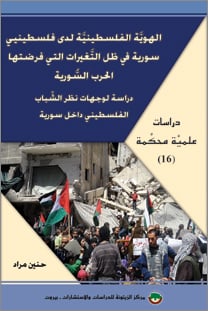Due to the Zionist colonial project in historic Palestine and the Nakbah in 1948, Palestinians have experienced geographical dispersion, leading to a nuanced adaptation across political, cultural and social realms based on their locations—whether within Palestine (1948 Palestinians), the Palestinian Authority areas (West Bank and Gaza Strip), or in the global diaspora, including major refugee countries like Syria, Jordan and Lebanon. This dispersion has also contributed to a complex understanding of identity, which intersects with religious, national, political and social dimensions, often compounded by the absence of a cohesive political and geographical framework.
The Intifadahs, conflicts and displacements Palestinians have endured throughout their history, alongside the resultant social and political transformations, have profoundly influenced their identity, presenting a challenging and multifaceted issue due to its intricate nature and the interplay of various elements and dimensions
Al-Zaytouna Centre for Studies and Consultations has published an Arabic academic paper entitled “Evolution of Palestinian Identity Amidst Wars: A Case Study on Syrian Palestinian Youth,” by Hanin Mourad.
| Click here to download: >>Refereed Academic Studies (16): The Palestinian Identity Among Palestinians of Syria in Light of the Changes Imposed by the Syrian War: A Study of the Views of Palestinian Youth Inside Syria … Hanin Omar Mourad |
The study investigates the evolution of Palestinian identity among Palestinian refugees in Syria and how it has been influenced by the new realities they face. Like the Syrian population, they have endured the devastating impacts of war, leading to displacement and upheaval across various facets of life. Many have experienced internal displacement within Syria, with some enduring multiple displacements, totaling approximately 280 thousand refugees. Additionally, around 120 thousand refugees have been forced to flee to neighboring countries and increasingly to Europe. These individuals were not included in this study due to their distinct circumstances and contexts.
The study focuses on Palestinian young people within Syria, chosen as the sample group due to being profoundly affected by the war and its aftermath. Enduring losses, hardships and the resultant economic and social upheaval, they represent a generation grappling with insecurity about their future. This impelled them to seek individual solutions to the challenges they confront, even though they are relied upon as the pivotal group to uphold the Palestine issue and navigate it through the newly imposed reality.
The study seeks to understand their perspectives on Palestinian identity, its diverse dimensions and elements, and the shifts in the situation of Syrian Palestinians brought about by the Syrian conflict and its aftermath. It explores how Palestinian identity and its associated practices have adapted to these changes, as well as the roles, aspirations and suggestions of these young individuals.
The study utilized an electronic questionnaire to gather data from a sample of 752 individuals. Results indicated that while most participants demonstrated awareness of the multifaceted nature of identity, they encountered difficulty in delineating national identity from its religious and cultural dimensions. Additionally, a majority emphasized the distinctiveness of Palestinian identity compared to others, while also acknowledging the crisis facing Palestinian national identity.
The Syrian war and its aftermath have undoubtedly brought about significant changes in the circumstances of Palestinian refugees in Syria. A majority of the sampled individuals attested to the deterioration of the economic situation. Socially, notable changes included displacement and migration, impacting the distribution and dispersion of Palestinian refugees within Syria. Politically, the majority acknowledged divergent positions among Palestinian factions. Regarding legal matters, most participants noted changes concerning real estate ownership laws and travel documents.
The study observed how these transformations impacted their Palestinian identity, with shifting priorities due to the war, heightened feelings of anxiety and caution, and increased social isolation. Consequently, identity took on a collective national character in response to the looming threats they faced. There was also a notable emotional attachment to their place of birth and upbringing, sometimes overshadowing their connection to the original homeland, while perceptions of Palestinians and their social status shifted among Syrians. Some even embraced a nuanced form of identification bridging Palestinian and Syrian identities, alongside changes in social customs during times of celebration, mourning, and holidays…
The study also observed a shift in the roles of Palestinian youth and their growing political marginalization. Traditional Palestinian factions and their youth organizations are perceived as failing to meet the aspirations and hopes of the youth. Expressions of identity such as sit-ins and political activities, as well as youth initiatives aimed at promoting Palestinian identity, have dwindled. The majority of respondents concurred that Palestinian identity has become increasingly fragmented.
| Click here to download: >>Refereed Academic Studies (16): The Palestinian Identity Among Palestinians of Syria in Light of the Changes Imposed by the Syrian War: A Study of the Views of Palestinian Youth Inside Syria … Hanin Omar Mourad |










Leave A Comment